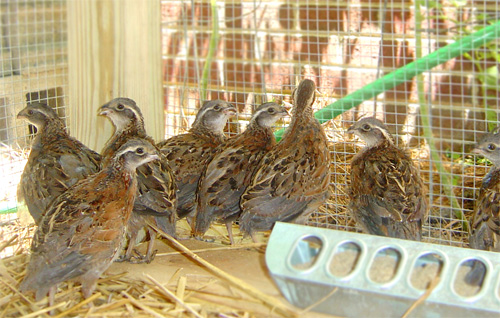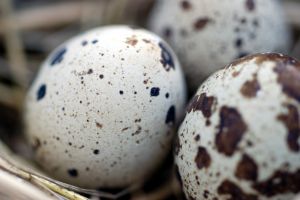
Quail are similar, yet different to chickens in a number of ways that may make raising them an attractive option for some. They are smaller, lay eggs on a more frequent basis and require less hands-on management. On the other hand they produce less in terms of food volume than their chicken counterparts. Here are a few things to mull over with respect to incorporating quail into your plans for self-sufficiency.

Quail vs Chickens
Quail start laying eggs after they are about six weeks old, and they generally lay one per day. Males are not as noisy or temperamental as their rooster counterparts, and they are usually less expensive to purchase. Quail also don’t seem to mind wire floors in houses or cages, and this reduces or eliminates the need to provide bedding as you do for chickens. There may also be fewer laws regarding keeping and raising quail as opposed to chickens as well.
One big difference is that chicken hens brood and incubate their eggs. Quail tend to lay them all over the place and keep moving on, so you will need to develop a way to incubate quail eggs if you plan on hatching them. Quail eggs are also much smaller than what chickens produce, so you will need more of them to offset this difference.
Quail themselves are much smaller than chickens, and this means that it doesn’t cost as much to feed them over the course of time. However, they are more sensitive to cold, so it’s important to keep their houses warm during the winter months. Quail also fly, so they can not free-range like chickens.
Things to Consider
Quail are very happy with runs and they don’t need a lot of space. They also nest on the ground. Consequently, making runs and beds of living areas with grass, small sticks or branches and other common forms of forest debris will keep them happy and entertained. Quail can be particularly destructive in the garden, but they love insects. Integrating quail into gardens requires a lot of planning as they love many common vegetables and tomatoes. You will need to build an enclosure so the quail don’t fly away as they wander through the garden, and you will also need to protect your crops with chicken wire to prevent them from pecking away at the plants.
Quail are also favored by a number of predators including rats and cats. This is another reason why they shouldn’t be allowed to roam free on or around your property. Many people report that quail populations decrease when more cats are present and increase in their absence. This makes sense since they nest in areas that are near to the ground and are prime targets for stalking predators. Keeping them in runs and secured in their cages at night will reduce the chances of them being attacked.

There is a different market for quail products than for chickens. Quail meat and eggs are considered to be more of a “delicacy”, and products can be worth more money. Furthermore, quail are commonly used for dog training and hunting as well. Consequently, you may be able to get more money from raising quail than chickens if you can tap into this market, but don’t expect to be able sell large quantities of eggs or meat like you can with chickens right away.
Quail meat tastes like chicken, but it is a little gamier. Eggs, as mentioned before, are much smaller but they tend to be firm and flavorful as well. There is also very little difference in the taste between chicken and quail eggs.
Learn more about the benefits and drawbacks to raising quail and decide if this is an option that may work for you. They are particularly beneficial in areas where not a lot of land is available or in communities where it is against the law to raise chickens. They may be just what you need to fill a particular niche in your self-sufficiency food chain.














